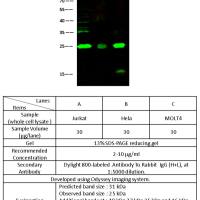Use of RNA Interference to Investigate Cytokine Signal Transduction in Pancreatic Beta Cells
互联网
互联网
相关产品推荐

IL-1 beta 多抗 (抗原亲和纯化)
¥600

TACSTD2/TACSTD2蛋白Recombinant Human Tumor-associated calcium signal transducer 2 (TACSTD2)重组蛋白Cell surface glycoprotein Trop-2 (Membrane component chromosome 1 surface marker 1) (Pancreatic carcinoma marker protein GA733-1)蛋白
¥1368

MKN45人低分化胃癌细胞|MKN45细胞(Human Poorly Differentiated Gastric Cancer Cells)
¥1500

人脐动脉内皮细胞总RNA
$323

Recombinant-Mouse-Interleukin-27-receptor-subunit-alphaIl27raInterleukin-27 receptor subunit alpha; IL-27 receptor subunit alpha; IL-27R subunit alpha; IL-27R-alpha; IL-27RA Alternative name(s): Type I T-cell cytokine receptor; TCCR WSX-1
¥14112
相关问答

